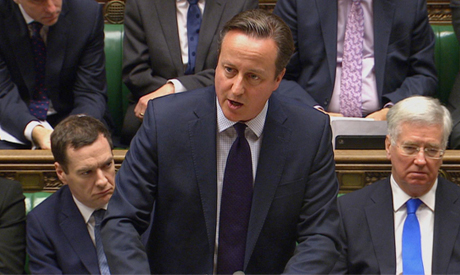
British Prime Minister David Cameron talks to lawmakers inside the House of Commons in London during a debate on launching airstrikes against Islamic State extremists inside Syria, Wednesday, Dec. 2, 2015 (Photo: AP)
Prime Minister David Cameron urged lawmakers on Wednesday to approve air strikes against ISIS in Syria, saying Britain could make a "real difference" to the U.S.-led campaign to destroy the militants.
Cameron's argument that Britain should launch more military action in the Middle East was all but drowned out by lawmakers demanding he apologise for suggesting that those opposing air strikes were "a bunch of terrorist sympathisers".
Cameron avoided making an apology, saying he respected those who disagree. But anger over the slur could stiffen opposition in Britain's Labour Party, whose leader, Jeremy Corby, criticised the Conservative prime minister for rushing to war.
Many Britons are wary of wading into another war in the Middle East after Western intervention in Iraq, Afghanistan and Libya failed to bring stability to the region and, some believe, led to the rise of ultra-radical groups like ISIS.
But since 130 were killed in ISIS attacks in Paris on Nov. 13, some lawmakers hitherto loath to launch further air strikes on militants in Syria now agree with Cameron that they are needed to protect Britain from such violence.
"The threat is very real," Cameron told a packed house of parliament at the start of a 10-hour debate due to culminate in a vote at around 2200 GMT.
"The question is this -- do we work with our allies to degrade and destroy this threat and do we go after these terrorists in their heartlands from where they are plotting to kill British people, or do we sit back and wait for them?"
Cameron said pursuing air strikes in Syria would not increase the likelihood of militant attacks on Britain because it was already in "the top tier of countries on the IS (ISIS) target list".
He also dismissed criticism that Britain could not make a difference, saying British warplanes, which have been bombing ISIS targets in Iraq for more than a year, and their precision strike capability would make "a real difference".
If lawmakers support Cameron, British air strikes - which finance minister George Osborne said would cost in the "low tens of millions of pounds" - could be launched from an air base in Cyprus within hours of a vote.
AVOID DEFEAT
Keen to avoid a repeat of a humiliating 2013 parliamentary defeat over plans to bomb the forces of Syrian President Bashar al-Assad, Cameron had made it clear he would not bring a vote to parliament if he did not think he could win it.
He was confident of getting the majority he needs after Corbyn, a veteran anti-war campaigner who says air strikes would be ineffective and kill civilians, allowed Labour lawmakers to vote according to their conscience in order to quell a rebellion in his party over military action.
But anger over local media reports that Cameron told Conservative lawmakers at a private meeting late on Tuesday not to vote with Corbyn "and a bunch of terrorist sympathisers" could harden opposition.
Corbyn said there should be no room for "abuse" in politics and joined at least 10 other lawmakers to call on Cameron to apologise. The prime minister did not do so.
Corbyn accused Cameron of "an ill-thought-out rush to war" before public support for further military action falls.
A YouGov opinion poll showed voter support for military action in Syria had fallen to the lowest level since September 2014, with 48 percent of respondents supporting strikes and 31 percent opposing.
"It is becoming increasingly clear that the prime minister's proposals for military action simply do not stack up," Corbyn told parliament, saying the prime minister had no long-term peace plan and strategy to destroy Islamic State. "The spectre of Iraq, Afghanistan and Libya looms over this debate."
Short link: